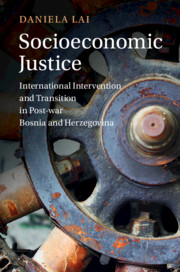Book contents
- Socioeconomic Justice
- LSE International Studies
- Socioeconomic Justice
- Copyright page
- Epigraph
- Contents
- Tables
- Acknowledgements
- Abbreviations
- 1 Introduction: ‘We Only Fight for Social Justice’
- 2 Theorising Socioeconomic Justice for Post-war Societies
- 3 Bosnia and Herzegovina between Its Post-war and Post-socialist Condition
- 4 The International Political Economy of Socioeconomic Injustice
- 5 Socioeconomic Violence as a Feature of War
- 6 Socioeconomic Justice as a Post-war Justice Claim
- 7 Socioeconomic (In)Justice as a Catalyst for Social Mobilisation
- 8 Conclusion
- Appendix Researching Marginalised Stories of Socioeconomic Violence and (In)Justice
- Bibliography
- Index
4 - The International Political Economy of Socioeconomic Injustice
Published online by Cambridge University Press: 02 May 2020
- Socioeconomic Justice
- LSE International Studies
- Socioeconomic Justice
- Copyright page
- Epigraph
- Contents
- Tables
- Acknowledgements
- Abbreviations
- 1 Introduction: ‘We Only Fight for Social Justice’
- 2 Theorising Socioeconomic Justice for Post-war Societies
- 3 Bosnia and Herzegovina between Its Post-war and Post-socialist Condition
- 4 The International Political Economy of Socioeconomic Injustice
- 5 Socioeconomic Violence as a Feature of War
- 6 Socioeconomic Justice as a Post-war Justice Claim
- 7 Socioeconomic (In)Justice as a Catalyst for Social Mobilisation
- 8 Conclusion
- Appendix Researching Marginalised Stories of Socioeconomic Violence and (In)Justice
- Bibliography
- Index
Summary
This chapter examines the limitations of international intervention in dealing with socioeconomic violence in Bosnia and Herzegovina. The argument advanced here is that the international intervention was limited in two respects: first, by its narrow understanding of ‘justice’; second, by the priorities embedded in post-socialist economic reforms, which left no space for justice considerations. Thus, the chapter analyses, on the one hand, how international officials in Bosnia understood transitional justice, as well as the limited and flawed implementation of return programmes, reparations, and other aspects of reparative justice. On the other hand, it looks at economic and social reforms promoted by international institutions at the end of the conflict, showing that they posed significant obstacles to redressing the legacies of socioeconomic violence and achieving socioeconomic justice. Reforms in the fields of labour laws and social policy, privatisations and industrial policy, and macroeconomic policy are analysed in this part of the chapter.
Keywords
- Type
- Chapter
- Information
- Socioeconomic JusticeInternational Intervention and Transition in Post-war Bosnia and Herzegovina, pp. 63 - 85Publisher: Cambridge University PressPrint publication year: 2020

